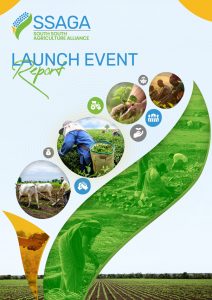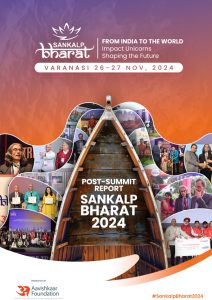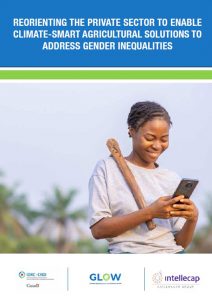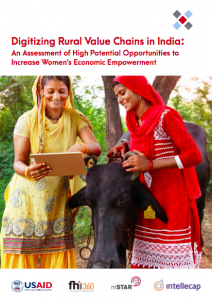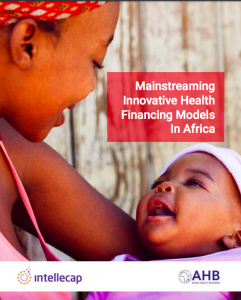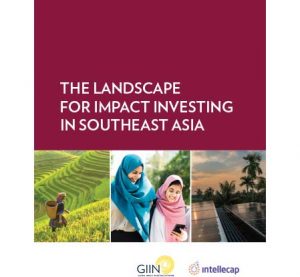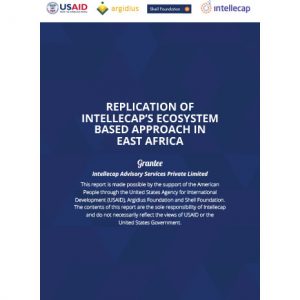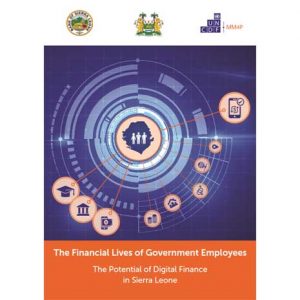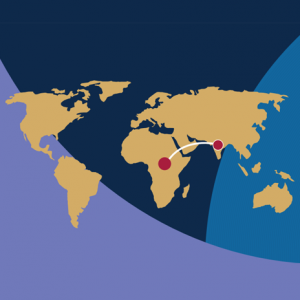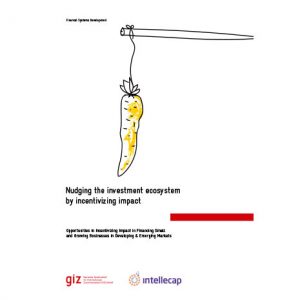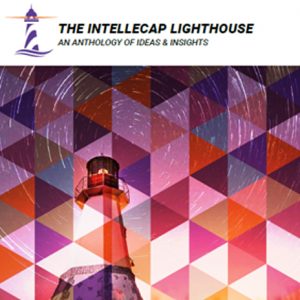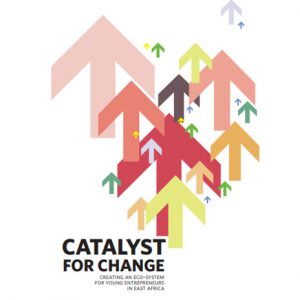TRENDING
-
SSAGA – Benefitting small-scale farmers by fostering innovations and collaboration across the Global South
Published: March, 2025 -
Sankalp Bharat 2024-Post Summit Report
Published: March, 2025 -
Reorienting The Private Sector To Enable Climate-smart Agricultural Solutions To Address Gender Inequalities
Published: February, 2025
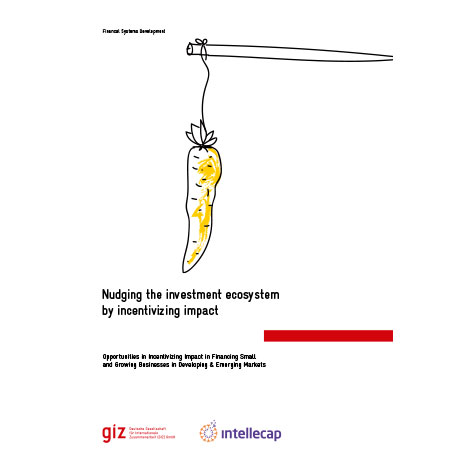
Nudging The Investment Ecosystem By Incentivizing Impact
PUBLISHED: June, 2018
Opportunities in Incentivizing Impact in Financing Small and Growing Businesses in Developing & Emerging Markets
This paper is a summary of fresh ideas on how to channel more capital into impact investing and incentivize impact creation. Building on insights generated by experts at the BMZ hosted conference Financing Global Development – Leveraging Impact Investing for the SDGs, the paper furthers the conversation on Impact Measurement and Management, IMM 2.0, through brainstorming practical ideas and viewpoints in the impact investing value chain: those who provide capital, those who manage it, and those who receive it. This included close to 50 stakeholders, including fund managers, DFIs, intermediaries, entrepreneurs, governments, CSOs and others.
The discussion, conducted in the form of a ‘design lab’ by Deutsche Gesellschaft für Internationale Zusammenarbeit (GIZ) GmbH, Intellecap, and the Swiss Agency for Development and Cooperation (SDC), aims to start a conversation on how to maximize impact by channeling capital into small and growing businesses (SGBs) as a way to expedite achievement of SDGs (Sustainable Development Goals). During the session, industry leaders like FMO, Vox Capital, and Roots of Impact had shared case studies of good practices in incentivizing impact along the investment chain. This formed the basis of brainstorming on development of new ideas on innovative instruments that could nudge the ecosystem towards more actively pursuing and scaling impact.
The result is an analysis of the barriers in the impact investment value chain highlighted during the stakeholder conversations, and key insights on how to overcome them (for example, the need for transparency, standardization, leadership, etc.). In addition, the workshop collated a list of potential ‘wild ideas’ to like impact currency, impact rewards, impact index, online market places for impact auctioning, and a give-back distribution impact support system, designed to incentivize increased levels of investment along the value chain. The practical approaches suggested by stakeholders fit well with the existing impact measurement and monitoring frameworks like GIIN’s IRIS and Intellecap’s PRISM and hold the potential to guide impact capital more efficiently by leveraging good practices.

The Financial Lives of Government Employees – Potential of Digital Finance in Sierra Leone
PUBLISHED: July, 2018
This report documents findings from research on the financial lives of government employees in Sierra Leone, commissioned by the Government to People Payments Project – Building Digital Ecosystem funded by USAID. Intellecap supported UNCDF, Government of Sierra Leone and Bank of Sierra Leone for conducting the research.
There are 80,000 government employees in Sierra Leone who receive salaries digitally in their bank accounts. Insights about their financial lives can help build a viable business case for DFS to expand access to a wide range of financial services for underserved communities in Sierra Leone. Such insights can inform strategies and use cases that the UNCDF and the Government of Sierra Leone can develop to promote DFS in the country. The National Strategy for Financial Inclusion 2017 – 2020 also refers to the need to identify and digitize use cases that will lead to habitual usage, and achieve Sierra Leone’s commitments to the ‘Better Than Cash Alliance’.
Recognizing the need and opportunity, UNCDF supported the Financial Lives Survey of government employees who receive their salaries digitally in Sierra Leone. Intellecap designed the survey to understand how government employees utilize salaries transferred into their bank accounts, their awareness of and access to DFS, avenues to use them and their perceptions about financial services and digital financial transactions. This report contains insights from the survey about potential customers of DFS and recommendations on use cases that could be piloted as an initial step to improve DFS adoption in Sierra Leone.
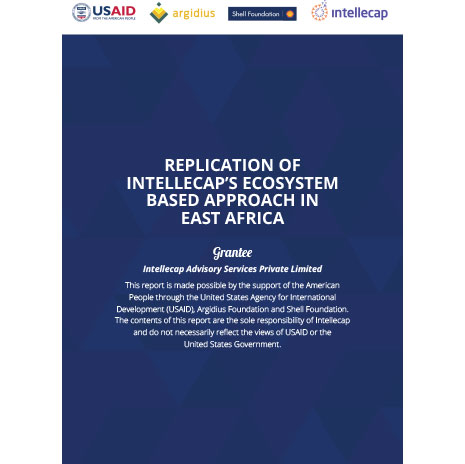
Replication of Intellecap’s Ecosystem Based Approach in East Africa
PUBLISHED: July, 2018
Intellecap has sought to replicate its ecosystem-based approach to East Africa by bringing
together capital, knowledge and networks to support SGBs at two levels: (i) provide direct support
to SGBs in the form of acceleration, fund-raising, technical assistance, innovation transfer, and
market linkages, and (ii) discover and engage critical ecosystem players such as corporations
(both local and international), accelerators, other development sector players in supporting SGBs.
In the three-year period since the launch of our initiative to replicate our ecosystem-based
approach for accelerating entrepreneurship support to SGBs in East Africa, we have received
generous support not only from our funders, but also from a number of local and international stakeholders such as development institutions, private sector entities, and industry associations.
Over the last year, we have replicated our advocacy platform (Sankalp), angel investment network
(I3N) advisory services (consulting & investment banking), virtual incubation platform
(StartupWave) and impact measurement platform (PRISM) as envisaged at the beginning of our
programmatic support. The development and adaptation of StartupWave for East Africa has
resulted in over 450 sign-ups for our early stage enterprise support activities and partnerships with
over 30 incubators / accelerators. Similarly, PRISM, our impact measurement platform, has
garnered interest from a wide variety of players to measure the impact of their programs.
All Publications
-
Digitizing Rural Value Chains in India: An Assessment of High Potential Opportunities to Increase Women’s Economic Empowerment
PUBLISHED: October, 2018READ MORE -
The Financial Lives of Government Employees – Potential of Digital Finance in Sierra Leone
PUBLISHED: July, 2018READ MORE -
South South Collaboration: Corridors for shared prosperity
PUBLISHED: June, 2018Tags: Entrepreneurship, Agriculture, HealthRegion: Asia, AfricaREAD MORE -
Intellecap Lighthouse: An anthology of ideas and insights
PUBLISHED: June, 2018Tags: Entrepreneurship, Innovation, Gender, Multi-sectorREAD MORE -
Catalyst for Change: Creating an ecosystem for young entrepreneurs from East Africa
PUBLISHED: June, 2018Tags: Health, Energy, Agriculture, LivelihoodsRegion: AfricaREAD MORE -
5TH SANKALP AFRICA SUMMIT – POST EVENT REPORT
PUBLISHED: April, 2018Tags: Access, Affordable, Entrepreneurship, Innovation, Health, Agriculture, Financial Services, Livelihoods, Energy, Strategy AlliancesRegion: AfricaREAD MORE
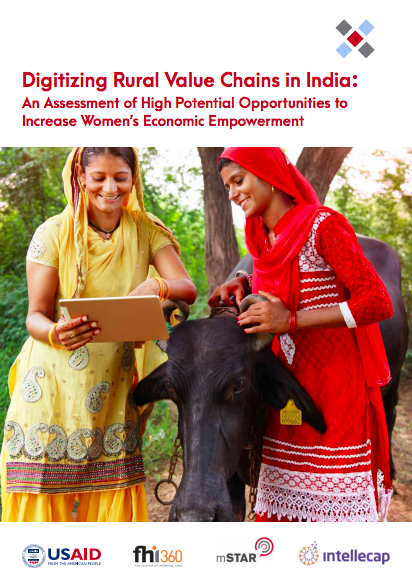
Digitizing Rural Value Chains in India: An Assessment of High Potential Opportunities to Increase Women’s Economic Empowerment
PUBLISHED: October, 2018
In our latest report, we highlight the role and impact of digital financial services (DFS) on economic empowerment of rural communities’ especially rural women in India through accelerated financial inclusion. The report has been released as a part of the Mobile Solutions Technical Assistance Program (mSTAR) initiative, supported by U.S. Agency for International Development and implemented by FHI 360. The initiative aims to create a digitally-enabled rural financial ecosystem to enhance farmers’ livelihoods through use of DFS. These solutions have the potential to drive down financial services delivery costs for customers and service providers, as well as offer services at greater convenience and scale, opening the door to economic empowerment and development.
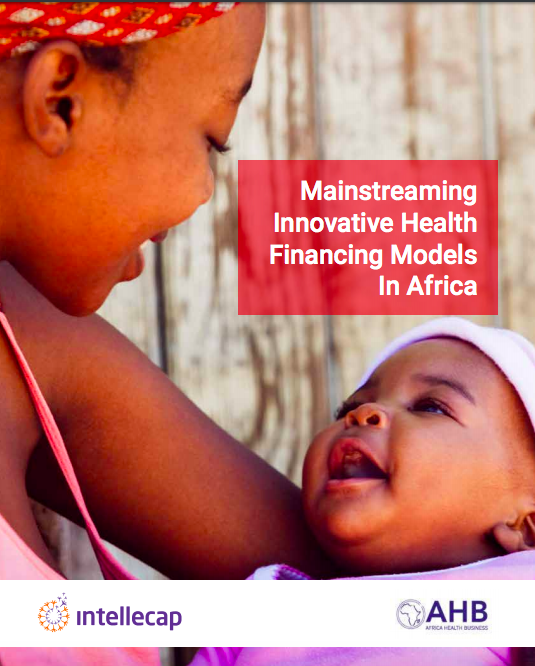
Mainstreaming Innovative Health Financing Models In Africa
PUBLISHED: October, 2018
Why are we trapped in pilotitis for innovative financing models in Africa? What will it take for us to move to scale? Is it only about lack of resources or is it much more?
These are some of the questions that currently float in the healthcare ecosystem in Africa like an elephant in the room, which we are aware but often ignore.
It is becoming inevitable that for health financing interventions to be scalable, sustainable and resilient for future generations, infrastructure needs to be cost recovering, value driven and services delivered in partnership with the private sector and catalytic investment. The private sector should not only be considered a funder alone but also a co-implementer of health solutions.
Mainstreaming Innovative Health Financing Models in Africa provides a holistic approach based on key internal, external and environmental drivers that will facilitate scale and address the existing barriers to successful replication of such initiatives.
To know more, please write to rajat@intellecap.net / sheena.r@intellecap.net
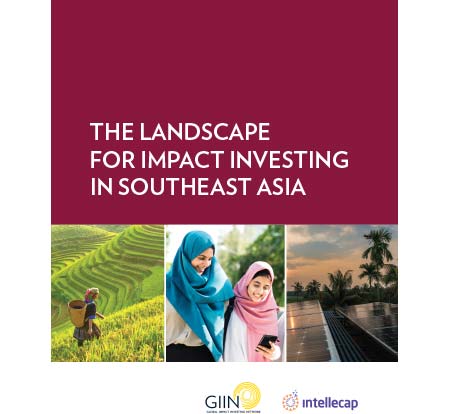
The Landscape For Impact Investing In Southeast Asia
PUBLISHED: August, 2018
The Global Impact Investing Network (GIIN), in partnership with Intellecap Advisory Services, has published The Landscape for Impact Investing in Southeast Asia, the first-ever detailed analysis of impact investing activity across Southeast Asia. The report was generously supported by Investing in Women, an initiative of the Australian Government which is partnering with impact investors to grow impact investments in women owned and led SMEs in Southeast Asia. The Landscape for Impact Investing in Southeast Asia provides deep insight into the three most active markets in the region: Indonesia, Vietnam, and the Philippines, and a broader regional overview of the remaining eight countries, namely Brunei, Cambodia, East Timor, Laos, Malaysia, Myanmar, Singapore, and Thailand.
Abhilash Mudaliar, Director of Research at the GIIN, says, “The Asia Pacific region has been the fastest growing impact investing market worldwide over the past five years. This report shows why that’s not surprising. The countries across the region offer dynamic business environments with increasing entrepreneurial and investment activity focused on ensuring inclusive and sustainable economic development.”
The report outlines opportunities and challenges for impact investors and analyzes regulatory and economic factors that inform investment decisions in each country. Overall, the report sheds light on a dynamic and expanding regional impact investing market:
•Investment activity in Southeast Asia has increased over time. Since 2007, Private Impact Investors (PIIs) have deployed USD 904 million through 225 direct deals, and Development Finance Institutions (DFIs) have deployed USD 11.3 billion through 289 direct deals. For both sets of investors, investment activity has increased significantly in recent years.
•Indonesia, the Philippines, and Vietnam are the three largest markets in the region accounting for over 60% of capital deployed to date. However, each country in the region faces its own set of social and economic challenges, and presents investors with unique opportunities to develop strategies that both generate a financial return and have a positive impact.
•The top three impact investment sectors in the region have been financial services, energy, and manufacturing, accounting for over 80% of total capital deployed. As the market expands there is growing interest and activity in sectors such as education, healthcare, and workforce development.
On the findings, Mudaliar notes, “Historically, most capital for impact investing in the region has originated from investors in North America or Western Europe. A particularly promising trend is the growing participation of local investors – led by wealthy families and high net-worth individuals. We expect this trend to expand rapidly across all investor segments in the coming years.”
The report also finds that there is increasing awareness and uptake of gender lens investment (GLI) strategies in the region, which are investments that seek to address gender disparities and/or examine gender dynamics to inform better investment decisions. A growing number of investors have started developing GLI strategies in recent years, with USD 40 million deployed into more than 30 deals in Indonesia, the Philippines, and Vietnam alone.
Dr. Julia Newton-Howes, CEO of Investing in Women, argues, “This important research provides much needed market intelligence for Southeast Asia and reveals the growing appeal of impact investing in the region. Importantly, moving capital with a gender lens can unlock a significant under-served market and additional social impacts. Obviously, investing with a gender lens has a long way to go in the region, particularly with development finance. But we recognize that impact investing will not reach its full potential without incorporating an intentional gender lens and are proud to partner with the GIIN and Intellecap on this publication.”
The Landscape of Impact Investing in Southeast Asia report is based on interviews conducted with over 100 stakeholders, a thorough review of existing research, and aggregate analysis of over 500 impact investing transactions made since 2007.

Replication of Intellecap’s Ecosystem Based Approach in East Africa
PUBLISHED: July, 2018
Intellecap has sought to replicate its ecosystem-based approach to East Africa by bringing
together capital, knowledge and networks to support SGBs at two levels: (i) provide direct support
to SGBs in the form of acceleration, fund-raising, technical assistance, innovation transfer, and
market linkages, and (ii) discover and engage critical ecosystem players such as corporations
(both local and international), accelerators, other development sector players in supporting SGBs.
In the three-year period since the launch of our initiative to replicate our ecosystem-based
approach for accelerating entrepreneurship support to SGBs in East Africa, we have received
generous support not only from our funders, but also from a number of local and international stakeholders such as development institutions, private sector entities, and industry associations.
Over the last year, we have replicated our advocacy platform (Sankalp), angel investment network
(I3N) advisory services (consulting & investment banking), virtual incubation platform
(StartupWave) and impact measurement platform (PRISM) as envisaged at the beginning of our
programmatic support. The development and adaptation of StartupWave for East Africa has
resulted in over 450 sign-ups for our early stage enterprise support activities and partnerships with
over 30 incubators / accelerators. Similarly, PRISM, our impact measurement platform, has
garnered interest from a wide variety of players to measure the impact of their programs.

The Financial Lives of Government Employees – Potential of Digital Finance in Sierra Leone
PUBLISHED: July, 2018
This report documents findings from research on the financial lives of government employees in Sierra Leone, commissioned by the Government to People Payments Project – Building Digital Ecosystem funded by USAID. Intellecap supported UNCDF, Government of Sierra Leone and Bank of Sierra Leone for conducting the research.
There are 80,000 government employees in Sierra Leone who receive salaries digitally in their bank accounts. Insights about their financial lives can help build a viable business case for DFS to expand access to a wide range of financial services for underserved communities in Sierra Leone. Such insights can inform strategies and use cases that the UNCDF and the Government of Sierra Leone can develop to promote DFS in the country. The National Strategy for Financial Inclusion 2017 – 2020 also refers to the need to identify and digitize use cases that will lead to habitual usage, and achieve Sierra Leone’s commitments to the ‘Better Than Cash Alliance’.
Recognizing the need and opportunity, UNCDF supported the Financial Lives Survey of government employees who receive their salaries digitally in Sierra Leone. Intellecap designed the survey to understand how government employees utilize salaries transferred into their bank accounts, their awareness of and access to DFS, avenues to use them and their perceptions about financial services and digital financial transactions. This report contains insights from the survey about potential customers of DFS and recommendations on use cases that could be piloted as an initial step to improve DFS adoption in Sierra Leone.
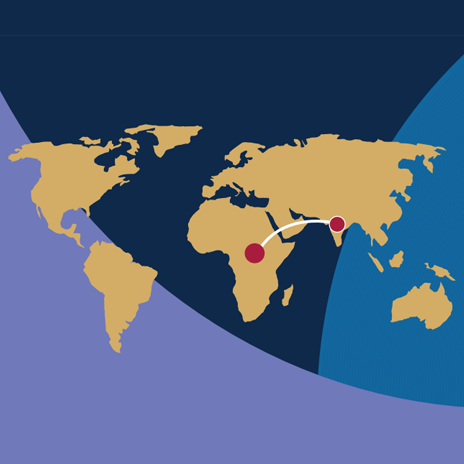
South South Collaboration: Corridors for shared prosperity
PUBLISHED: June, 2018
This assessment was conducted and document written for the International Finance Corporation (IFC)
by Intellectual Capital Advisory Services (Intellecap).
disclaimer
IFC, a member of the World Bank Group, creates opportunity for people to escape poverty and improve their lives.
We foster sustainable economic growth in developing countries by supporting private sector development, mobilizing
private capital, and providing advisory and risk mitigation services to businesses and governments. This report was commissioned by IFC through its Inclusive Business Models Group, which is leading efforts to promote inclusive business across IFC by catalyzing ideas and innovation; convening IFC clients, investment professionals and leading thinkers on inclusive business; and communicating which models work, and generating and disseminating knowledge on best practices.
The conclusions and judgments contained in this report should not be attributed to, and do not necessarily represent the views of, IFC or its Board of Directors or the World Bank or its Executive Directors, or the countries they represent. IFC and the World Bank do not guarantee the accuracy of the data in this publication and accept no responsibility for any consequences
of their use.
Resources: Additional knowledge resources that use the framework as a foundation to create actionable insights have also been created. These include a deep-dive report, detailed case studies and a downloadable toolkit comprising of a self-diagnostic tool and checklists. The 11 case studies of successful business model transfers can be accessed here. Please find the technical notes here and the toolkit for entrepreneurs evaluating expansion into Africa here.

Nudging The Investment Ecosystem By Incentivizing Impact
PUBLISHED: June, 2018
Opportunities in Incentivizing Impact in Financing Small and Growing Businesses in Developing & Emerging Markets
This paper is a summary of fresh ideas on how to channel more capital into impact investing and incentivize impact creation. Building on insights generated by experts at the BMZ hosted conference Financing Global Development – Leveraging Impact Investing for the SDGs, the paper furthers the conversation on Impact Measurement and Management, IMM 2.0, through brainstorming practical ideas and viewpoints in the impact investing value chain: those who provide capital, those who manage it, and those who receive it. This included close to 50 stakeholders, including fund managers, DFIs, intermediaries, entrepreneurs, governments, CSOs and others.
The discussion, conducted in the form of a ‘design lab’ by Deutsche Gesellschaft für Internationale Zusammenarbeit (GIZ) GmbH, Intellecap, and the Swiss Agency for Development and Cooperation (SDC), aims to start a conversation on how to maximize impact by channeling capital into small and growing businesses (SGBs) as a way to expedite achievement of SDGs (Sustainable Development Goals). During the session, industry leaders like FMO, Vox Capital, and Roots of Impact had shared case studies of good practices in incentivizing impact along the investment chain. This formed the basis of brainstorming on development of new ideas on innovative instruments that could nudge the ecosystem towards more actively pursuing and scaling impact.
The result is an analysis of the barriers in the impact investment value chain highlighted during the stakeholder conversations, and key insights on how to overcome them (for example, the need for transparency, standardization, leadership, etc.). In addition, the workshop collated a list of potential ‘wild ideas’ to like impact currency, impact rewards, impact index, online market places for impact auctioning, and a give-back distribution impact support system, designed to incentivize increased levels of investment along the value chain. The practical approaches suggested by stakeholders fit well with the existing impact measurement and monitoring frameworks like GIIN’s IRIS and Intellecap’s PRISM and hold the potential to guide impact capital more efficiently by leveraging good practices.

Intellecap Lighthouse: An anthology of ideas and insights
PUBLISHED: June, 2018
Intellecap has been at the forefront of developing insights and shaping new ideas that have benefited
and empowered underserved markets since its inception in 2002.
Along the course of it’s journey, the organization has taken bold initiatives to foray into uncharted
territory and become a key influencer as part of the social impact discourse.
Intellecap has made concerted efforts through its advisory team to capture the most relevant themes
across its key focus sectors, namely Agriculture, Livelihoods, Financial Services, Healthcare and Energy,
and distil them into concrete thought pieces that lend credibility and offer definitive solutions across
key stakeholder groups.
The Intellecap Lighthouse is a culmination of various perspectives and insights from its thought
leaders on topics that demand our attention today, and trends that will capture our imagination in the
future.
Be it the Uberization of financial services, approaches for solving healthcare challenges in low resource
settings, the potential for Agtech in Southeast Asia, or a Special Series collaboration on India in 2050.
This caravan of articles and ideas is meant to help you gain newer insights from the impact sectors
and draw inspiration from the ecosystem we serve. Written by employees both old and new, many of
them have been published by reputed print media, and serve as a testimony to its relevance while being
engaging in thought and appeal.
You can now download this booklet, available in a simple PDF format, and navigate through its myriad
scope of contents. You can also directly go to an article/sector of your choice by clicking on the title in
the index page.
We’ve tried our best to ensure this compilation serves as a useful means of reference and information,
and that with time, The Intellecap Lighthouse will be regarded as a critical piece of commentary on the
state of affairs in the markets we serve, or aspire to serve.
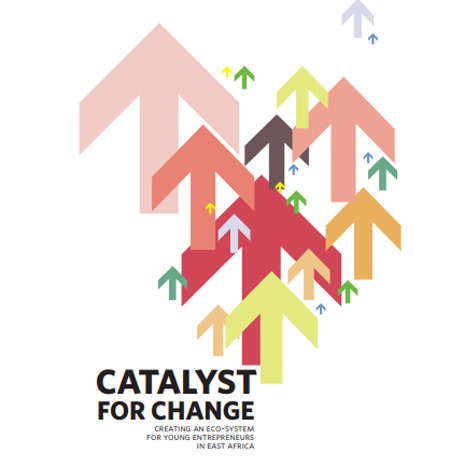
Catalyst for Change: Creating an ecosystem for young entrepreneurs from East Africa
PUBLISHED: June, 2018
Intellecap is a pioneer in providing innovative business solutions that help build and scale profitable and sustainable enterprises
dedicated to social and environmental change. The company’s unique positioning at the intersection of social and commercial business
sectors allows it to attract and nurture intellectual capital that combines the business training of the commercial world with the passion
and commitment of the social world to shape distinctive solutions. Intellecap was founded in 2002 and has more than 100 employees.
Intellecap has worked with more than 60 clients on over 250 engagements across 15 countries.
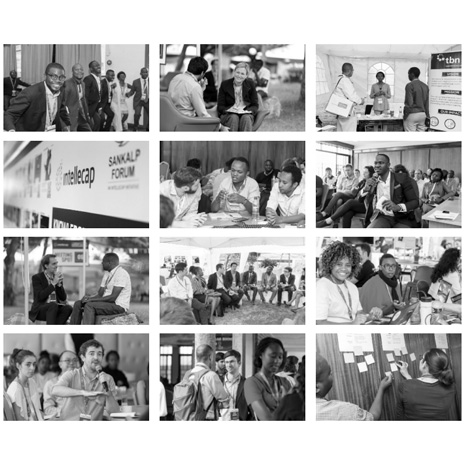
5TH SANKALP AFRICA SUMMIT – POST EVENT REPORT
PUBLISHED: April, 2018
“The 5th Edition of the Sankalp Africa Summit positively engaged over 1,000 different stakeholders, across the Impact Investing Ecosystem, and deliberated on strategies for building partnerships and collaborations to drive the sustainability and inclusion agenda in Africa. With 100 + Speakers, 30+ Partners, 60+ Sessions and delegates from over 40 countries, it truly was a summit to reckon with, trending at Top 5 on Twitter.
This year’s theme, ‘Open Alliance for a Sustainable & Inclusive Africa 2030’, revolved around the Sustainable Development Goals and how various partners can work with the private sector to achieve these goals. The summit highlighted what has been achieved so far and delved deeper into the untapped opportunities presented by the SDGs in Africa for the entrepreneurs, corporates and the development community. ”
Reports & Policies
Our Impact Map

Sign up for our newsletter
© Copyright 2018 Intellecap Advisory Services Pvt. Ltd. - All Rights Reserved



